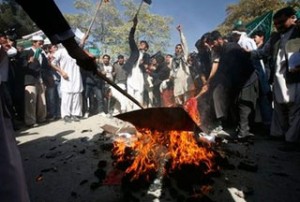German minster refuses to resign over Afghan raid

German Defense Minister Karl-Theodor zu Guttenberg has firmly rejected calls for his resignation on allegations of deception over a controversial German-ordered strike in Afghanistan.
The remarks, made on Germany’s RTL television network on Sunday evening, were in response to calls by opposition leaders Sigmar Gabriel of the Social Democratic Party (SPD) and Green Party leader, Juergen Trittin.
“Even if it gets really stormy, I will stay right where I am…That’s the way I was brought up and that’s the way I’m going to deal with it,” Guttenberg said.
He turned the table on the two opposition leaders and accused them of hypocrisy, saying they had had access to the same sources of information as he had.
September’s strike, condemned for its large civilian death toll in the northern Afghan city of Konduz, has already seen two top military officials stepping down over similar claims
In November, Guttenberg defended his decision to force the resignations of labor minister and former defense minister Franz Josef Jung and German military’s chief of staff, Wolfgang Schneiderhahn, for withholding information over the details of the strike.
The sackings were a dramatic turnaround from his earlier declarations that the Konduz strike was “militarily appropriate.”
Now the opposition’s clamor for Guttenberg’s resignation has been steadily rising following new revelations by Schneiderhahn, who claims to have informed the minister of major details in a report conducted by NATO’s International Security Assistance Force (ISAF) mission as well as the one by the Red Crescent.
According Germany’s ARD channel, the NATO report based on the testimony of the German commander who called in the US raid shows that German troops were never in imminent or direct danger of an attack by the Taliban militants — the key justification of the strike.
The commander, Colonel Georg Klein, ordered the strike after receiving intelligence that two fuel trucks had been stolen, sparking fears that they would be used as mobile bombs by the Taliban militants.
Germany initially defended the strike and argued that the civilian toll had been inevitable.
However, weekend media reports revealed that Klein had also ordered the strike to “destroy” the nearby people, presumably the Taliban militants, and not just the two stolen fuel trucks.
If confirmed, this would betray a serious violation of the terms of the parliamentary mandate for Germany’s 4,300 troops in Afghanistan, which explicitly bans the intentional killing of civilians.
Chancellor Angela Merkel’s spokesman, Ulrich Wilhelm, on Monday denied the existence of an Afghan policy that changes the country’s rules of engagement, especially on targeting people.
The deadly raid that left 142 people dead, including at least 30 civilians, has pushed the country’s unpopular presence in war-torn Afghanistan into the limelight.
Analysts believe this will make it significantly harder for re-elected Merkel to argue in favor of a US-request for extra troops at a time when the parliament’s expansion of the troops’ mandate has already met with strong opposition.
In a Thursday report published in the Bild daily, sources from the German military circles were quoted as saying that members of an elite German taskforce, codenamed “Taskforce 47,” may have been involved in consultations with the German general who ordered the widely-criticized airstrike near Konduz.
“Now if should be revealed that the KSK [Special Forces Command] were responsible for this bombing, the KSK could not survive in its current form. Then we would soon have ‘the state within a state’ debate,” SPD spokesman, Rainer Arnold, told the Berliner Zeitung.
He urged Guttenberg not to hide behind an inquiry committee investigating the strike and not to postpone a statement until the findings are published.
He demanded an immediate response to questions on whether the KSK or the Federal Intelligence Service (BND) was involved in the strike.
He said these were the sort of questions that the general needed to answer to his defense minister, adding that a defense minister who did not ask for or posses such questions should be deemed incompetent.







